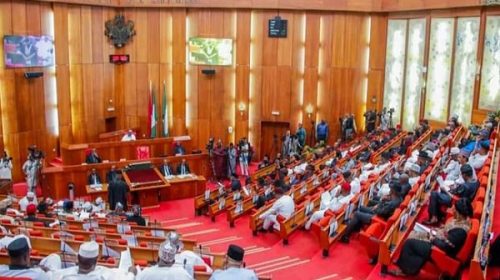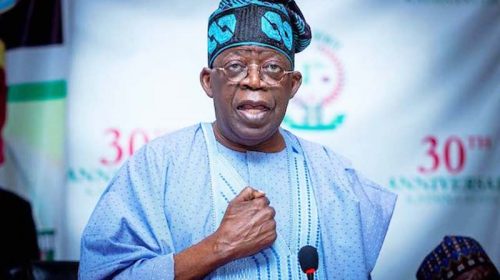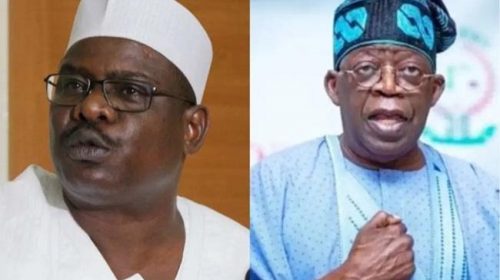Signing of 2017 Budget, critical for economic recovery, growth… Osibanjo

signing ceremony in Aso Presidential Villa. Standing close
to him (from R) are senior special assistant to President
Buhari on national assembly matters (senate), Ita Ennang and
senate president, Bukola Saraki.
The acting President, Prof. Yemi Osinbajo described the signing into law the 2017 appropriation bill into law as a major milestone in the nation’s economic recovery.
“This is an important milestone in our economic recovery and Growth plan laid in April by President Muhammadu Buhari.
“I would like to express my appreciation to the Senate President, the Speaker of the House of Representatives, as well as the entire leadership and members of the National Assembly for completing work on the 2017 Appropriation Bill. And I will return to this point presently.
“The process of preparing and processing this Bill was much smoother than the 2016 Appropriations Bill. On the executive side, there were no allegations of errors, or mistakes, and there was a significant improvement in the quality of the preparation, as well as the presentation.
“I wish to commend the Ministry of Budget and Planning for such a remarkable improvement over a single budget cycle.
“On the side of the National Assembly, I wish to commend the collaborative spirit of the engagements our MDAs had with their various committees, and with the leadership, during the budget defence sessions. There were far fewer reported cases of acrimony, or hostile wrangling this year, than in the past”, said Osibanjo.
Osinbajo yesterday signed into law the 2017 budget following the passage of the 2017 appropriation bill by the assembly a month ago.
The budget was first presented on December 14, 2016, to the two chambers of the national assembly by the President Muhammadu Buhari, had an estimate of N7.28 trillion but was raised to N7.44 trillion by the federal lawmakers.
The breakdown of the budget showed that N434.4 billion was appropriated for statutory transfers to the National Judicial Council (N100 billion); Niger Delta Development Commission (N64.02 billion); Universal Basic Education (N95.2 billion); National Assembly (N125 billion); Public Complaints Commission (N4 billion); INEC (N45 billion); and National Human Rights Commission (N1.2 billion)
“It’s an important milestone in our economic recovery and growth plan laid in April by President Buhari,” Osinbajo said shortly after the signing ceremony in Aso Presidential Villa which was attended by the senate president, Bukola Saraki, speaker, house of representatives, Yakubu Dogara, senior special assistant to the president on national assembly matters, (senate), Ita Ennang, among others.
The signing took place hours after Osinbajo was directed to sign the budget by President Muhammadu Buhari, currently on extended sick leave in London.
Buhari, according to the senior special assistant to the president on media and publicity, Malam Garba Shehu, observed that it is in the interest of the nation’s economy for the acting president to sign the 2017 Appropriation Bill into law.
In a statement issued in Abuja, Shehu quoted Buhari as saying that “the signing of the budget by the acting president would further buttress unity at the highest level of government.”
He also stated that the president was delighted the federal executive councils’ decision to submit 2018 budget proposals by October, while the national assembly would conclude the appropriation process by December 2017.
He said: “Following the receipt of full brief on the 2017 appropriation bill as passed by the national assembly, and to buttress the unity at the highest level of government, President Muhammadu Buhari has indicated that it is in the interest of the nation’s economy for the acting president, Prof. Yemi Osinbajo, to sign the Appropriation Bill into law.
“The president also said he was pleased by the joint resolution that the executive would submit next year’s budget proposals by October 2017.”





Leave a Reply